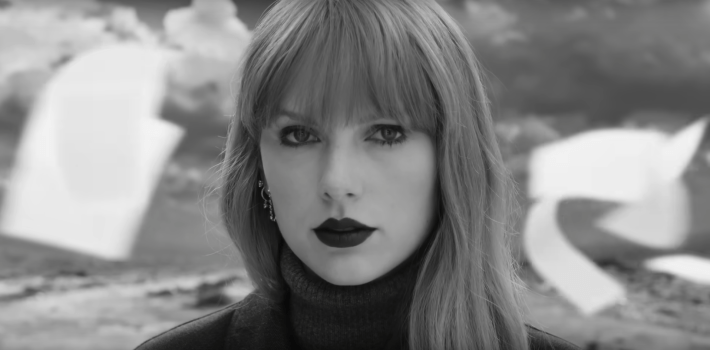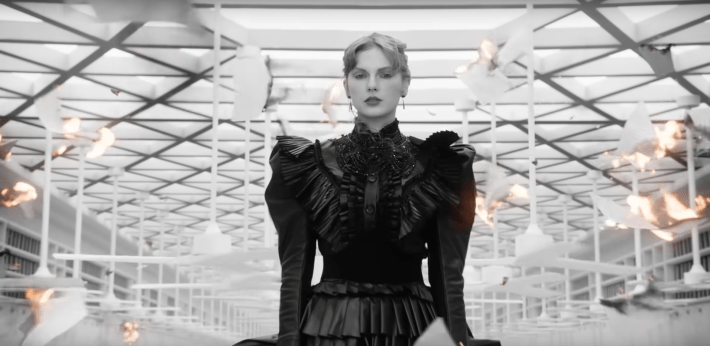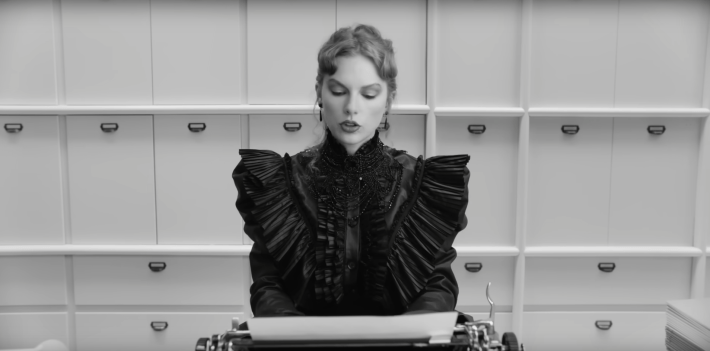Much as I have tried, it is impossible to escape Taylor Swift. I have opinions on her mostly against my will. She makes music that I don’t particularly like; what other people hear as relatable I have always found alienating. What I often find more frustrating than her superstardom is the way the press has breathlessly hung onto her every statement, which reached its nadir in her interview with Time when she was declared person of the year.
“Swift has told me a story about redemption, about rising and falling only to rise again—a hero’s journey. I do not say to her, in our conversation, that it did not always look that way from the outside,” writes Sam Lansky for Time. “But then I think, Who am I to challenge it, if that’s how she felt?”
My response is, well, you are a journalist, and Swift is giving you an interview. It is the very definition of your job to question the narrative she presents you—yet Swift has become too famous, too beloved, too simply everywhere to be held to account, it would appear.
With the release of her most recent album, The Tortured Poets Department, whatever chokehold Swift has had over the press seems well and truly over. The critical response has echoed complaints I’ve had about Swift’s craft for many years: The songs are overly wordy and full of clunkers. The subject matter, mostly about her victimhood and an imaginary destined love, does not seem fitting for a thirty four-year-old woman. The songs kind of all sound the same. Chris Richards from the Washington Post writes, “Is this the album that grants us societal permission to say that Swift is not a great lyricist? She can be, sometimes, but greatness isn’t a part time job.” A review from Paste, which ran without a byline to protect the safety of its author, opens with the rather tasteless zinger, “Sylvia Plath did not stick her head in an oven for this!” In the New York Times, Lindsay Zoladz writes that Swift could use an editor.

In listening to the album, it’s clear that these critics are correct. The album feels like a slog at its original 16 tracks, but the additional 15 tracks of what Swift called a “double album” and dubbed The Anthology make it what Richards calls “a two hour hostage situation.” The lyrics are impenetrable if you aren’t in touch with Swift’s personal life—as a fan of celebrity gossip, I have the misfortune of being able to trace which songs are probably about her English ex or her brief fling with a man who looks like a sentient wet cigarette or about the famous football player she is currently dating. More than that, once she starts singing on a track she never gives the songs a moment to breathe. The instrumental music feels like an afterthought, a blank page to stand as the backdrop to the sheer volume of lyrics Swift has produced. After a while, you feel like you’re listening to an unhinged rant from a friend about a guy who came to dinner dressed in red flags. You’re right, honey—he was so mean to you. Are you gonna finish those fries?
From my perspective, these are all criticisms that should have been levied at Swift much earlier. Then again, I remember when Jillian Mapes gave Swift‘s 2020 album Folklore an 8.0 at Pitchfork and was doxed by Taylor Swift fans for not declaring it perfect. Swift is not just a victim of her own success, but of an approach to pop music criticism that’s often referred to as “poptimism.” It’s a response to “rockism,” a school of criticism often attributed to Rolling Stone founder Jann Wenner, who recently said that black and women musicians were not articulate enough to be included in his 2023 book of interviews with rock musicians. You can already see why people would perhaps tire of a point of view with origins such as those.
Rockists held up guitar-based music made by men as the pinnacle of modern music. Pop music, often made and enjoyed by women, was not given the same level of analysis as rock music. But making and performing pop music is also an art, and it’s music that means a lot to a lot of people. The poptimist approach was to take this music seriously, to try to understand why it’s popular, to give the people who make pop music the same adulation as the people who make rock music. As much as it is a valid approach to looking at art, it’s also a little bit tit-for-tat for my tastes. Sometimes the soaring ways that artists like Swift are described in reviews make me feel like the critics are simply making up for lost time, adding more praise onto the present to make up for its lack in the past.
Her words may reflect some tension under the surface, but the music never does.
The Tortured Poets Department shows the limits of this critical approach. The songs are just not interesting, but critics seem to feel obliged to treat them as such. It should be more normal to admit that popular artists are often popular because they are marketable. Swift is a capable songwriter, and certainly a popular one, but she is not a challenging artist–if she were, it might be more difficult for her to be as popular as she is. Her music is unwilling to ruffle feathers, though she comes closest in Tortured Poets, at least in the sense that she doesn’t mind expressing some of her frustrations with fame. In “But Daddy I Love Him,” she chastises fans for judging her personal life, singing, “God save the most judgmental creeps who say they want what's best for me, sanctimoniously performing soliloquies I'll never see.”
The sentiment is understandable, but also confusing in the context of this album. In Tortured Poets she continues to give us tantalizing glimpses into her life, referencing real events and people, sometimes even by name. She is frustrated at the violation of her privacy, but also willing to give her fans the exclusive glimpse into her life that they desire. Even at her angriest, her songs are soothing, mid-tempo, synth-pop tunes. Her words may reflect some tension under the surface, but the music never does.
The overall effect of these components, the specificities of the lyrics contrasted with the blandness of her music, make Tortured Poets feel exhausting to listen to. It sounds more like you’re watching a YouTube video about Dark Souls lore than listening to music. It becomes frustrating when you look back on her catalogue and see that she hasn’t always relied so much on proper nouns to give texture to her music. When I have felt a longing for someone I used to date, sometimes my brain just conjures up the phrase “loving you was red,” from the title track of Swift’s album Red. It’s not a phrase that really means anything—-but because it is so empty, I feel like I know what she means, what it’s like to feel wrapped up in red passion like an embrace.

When people call Swift a great lyricist, that’s what I assume they mean: She can take her own experiences and create a song that describes your experiences too. But in Tortured Poets, that broad relatability that lets you write yourself into her songs has been replaced by too many proper nouns, steeped in years and years of lore that I’ve watched play out in paparazzi walks and album rollout cycles. After thirty one songs, whatever Swift is trying to express is smothered in the sheer glut of material.
When she isn’t singing about her very specific heartbreak, she’s singing about the specifics of fame, and I couldn’t help but think about another artist who shares a lot in common with her: Britney Spears. Understanding her both as a product but more importantly as a person—and an often traumatized person—creates new meaning in the songs themselves; this is essentially the thesis of poptimism as a critical approach.
On its own, a song like “Lucky” is cliche and cloying; knowing the great arc of Spears’s life, from her virginal sex appeal to her conservatorship and deteriorating mental health, it sounds like a desperate cry made in the only way she could. Spears has never been a great singer, but when she asks in the third person “if there’s nothing missing in her life, then why do these tears come at night?” you can’t help but feel a brief empathy for her.
Swift is more direct with her frustrations with superstardom. She prides herself at being able to “do it with a broken heart,” but also ends the eponymous song with the somewhat snarky spoken statement, “I’m miserable—and no one knows!” Well, we do now, and we seem to also know she’s bitter, angry, feels judged, and is resentful of even her own fan base. I can’t blame her for those feelings, but given how forthcoming and direct she is about them, and everything she expresses on Tortured Poets, it makes me want to roll my eyes. “Lucky” still elicits sympathy from me because Britney’s pain extends beyond heartbreak: she was robbed of a life. For twenty years, Spears was placed under a controversial conservatorship that put her father, Jamie Spears, in charge of her finances, career, and her personal life. After she settled the lawsuit with her father, Spears wrote on Instagram, “there has been no justice and there probably never will be.” By contrast, Taylor Swift has complete control over her career and music, going so far as to re-recording her earlier material after her master recordings were bought by music industry executive Scooter Braun. The heartbreak that inspired this record hasn’t even lasted very long. She is the most famous woman in the world, a billionaire, dating someone who has won the Super Bowl.

Creating a relatable, marketable song from her very specific personal life has often been cited as the source of Swift’s great talent, and in Tortured Poets, she gets there in places. The opening song, “Fortnight,” describes a situation where Swift is eventually living next door to someone she used to love deeply after they’ve both married other people. “I love you, it’s ruining my life,” she sings sleepily. “I touched you for only a fortnight… but I touched you, I touched you.”
The later songs go from the imagined to the real, often referencing specific people and places. But knowing who Lucy and Jack are (Lucy Daucus from Eras tour opener Boy Genius and Swift’s longtime collaborator Jack Antonoff) when she sings about them in the title track of the album does not create any deeper meaning for the listener. It’s just gossip. At the end of the day, I don’t want to feed into this loop of attention that Swift seems to hate. I want to know less about her. Which isn’t to say that she shouldn’t express herself—but that pop music is more than the sum of its parts, more than just confessions of love and pain. It’s in the act of searching for commonality that we find the feelings that bind us all together.


